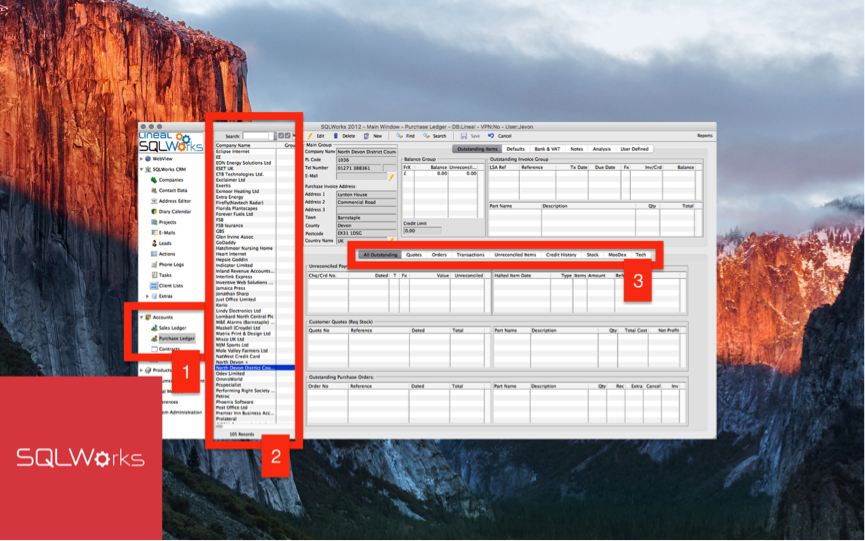
SQLWorks Purchase Ledger is your main accounting ledger for your ordered items and purchase transactions with other companies.
Purchase Ledger can be found under the ‘Accounts’ heading in the main NavBar (1) and helps manage each stage of the buying process. Any chosen company from your Companies List can be given a purchase Ledger account, and appears in the list panel (2).
In the main window the top panel displays purchasing information relating to that company, including contact details, outstanding invoices and default settings for your purchases from that company, such as a credit limits and nominal codes.
The first ‘All Outstanding’ tab in the lower panel shows a useful summary of your unreconciled payments, customer quotes, outstanding purchase orders and halted items. From left to right tabs headed ‘Orders’, ‘Transactions’ and ‘Unreconciled Items’ (3) allow you to enter each stage of purchasing by clicking on it – keeping a close track on orders placed and received, and money owed.
Unlike your Sales Ledger, items must follow a dual progression to account for both order and invoicing – by logging ‘receive orders’, SQLWorks can support staged deliveries, or other orders that are delivered and invoiced separately by your suppliers.
Users with SQLWorks advanced stock module can track incoming stock items as ‘In Transit’ whilst awaiting delivery, while all users can take account of part orders, expected time of arrival (ETA), and even batch multiple orders as a single ‘delivery.’ ‘Pending Stock’ under your ownership can be allocated, but other SQLWorks functions are restricted to prevent the mis-selling of items not yet physically available for onward dispatch.
Once you have been invoiced, SQLWorks Purchase Ledger allows your business to reconcile multiple orders against a single invoice, flexibly matching your suppliers’ invoicing format. Saved default settings allow SQLWorks to remember other payment conditions for each supplier, such as price rounding and VAT rules, and (with CRM document storage) archive files such as digital copies of supplier invoices.
Payments can be grouped together or processed via BACS, an authorisation system allows larger organisations to set customised purchasing limits for staff, and force users to clear orders past an administrator before being placed. Spending limits can be set by order, outstanding amount, over a chosen time period, or a combination of these for maximum security.
Every reconciled invoice is linked directly by a nominal code to your nominal code category, so SQLWorks always gives an accurate, real-time reflection of your current purchasing finances in your Nominal Ledger.